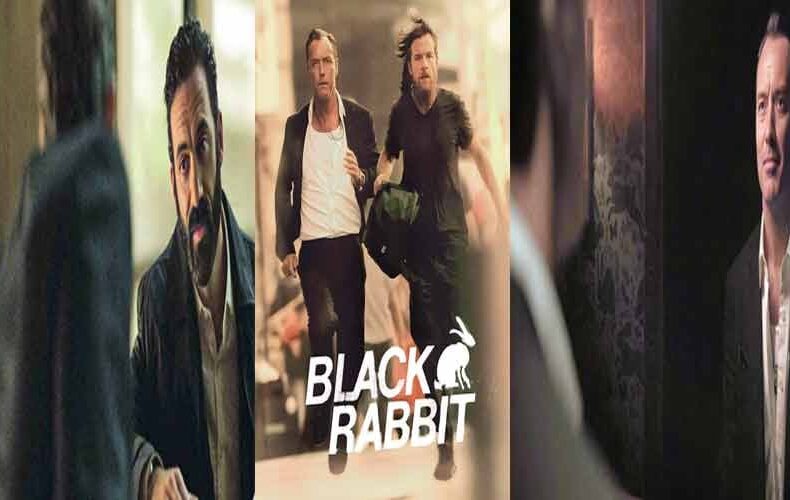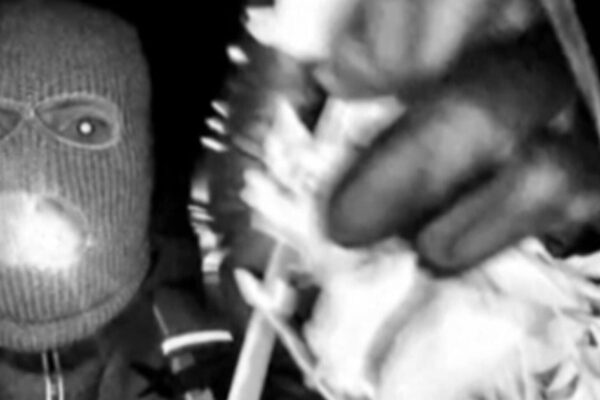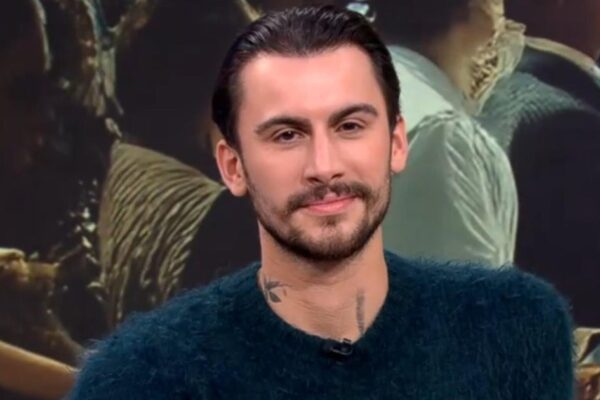
In the picture
**Black Rabbit**
*Starring:* Jason Bateman, Jude Law, Cleopatra Coleman, Abbey Lee, Dagmara Dominczyk, and Troy Kotsur
*Created by:* Zach Baylin and Kate Susman
While Jude Law’s criminally underrated crime thriller *The Order* failed to make its mark on the awards circuit, its production ultimately led to a limited series poised to become Netflix’s next big conversation-starter—if it can break through the binge-model barrier.
Created by *The Order*’s Zach Baylin and Kate Susman, *Black Rabbit* is a dark, cautionary tale about brotherhood, addiction, and keeping things above board. If you thought Cain and Abel were bad, you simply haven’t met Jake (Jude Law) and Vince (Jason Bateman) Friedken yet.
—
*Black Rabbit* starts slow, introducing audiences to Jake Friedken in isolation from the chaos he’s on the precipice of experiencing. He’s a well-dressed glad-hander who manages to avoid being pinned as a sleazeball by virtue of being a down-to-earth guy who loves his son, maintains a good relationship with his ex-wife (Dagmara Dominczyk), and possesses a degree of earnestness that isn’t just for show. All these elements surface within the first five minutes as Jake makes his way to his restaurant, the eponymous Black Rabbit.
Things fall apart quickly once he arrives and delivers a brief speech about the restaurant’s ethos—wanting to create a place where “the night could go anywhere.” In the seconds that follow these ominous words, gunmen emerge, items are stolen, and people get shot. It’s an explosive introduction to the world of *Black Rabbit*, with many nuances in the scene becoming even clearer on a rewatch.
—
With a gun shoved in Jake’s face, the series jumps back to one month before the hold-up. Flashbacks are one of the most divisive storytelling tools, but Susman and Baylin manage to circumvent the device’s usual pitfalls by maintaining the same pace and stakes across the present timeline, recent past, and childhood flashbacks. Some flashbacks are pure fun, offering glimpses into the brothers’ former lives as rock stars. Who could argue with watching a Temu Kurt Cobain-styled Jude Law sing grungy music alongside Jason Bateman and far too many rabbit-headed bodies?
This brief diversion from the tense, nail-biting present-day plot serves to deepen the narrative’s texture.
—
As the mystery unfolds around who would do this to Jake and the restaurant’s “family,” *Black Rabbit* morphs into a whodunit. As revealed in the premiere, Vince has reentered Jake’s life after circumstances drove them apart—and he’s nothing but trouble. To elaborate, he’s the kind of trouble who lacks remorse after killing someone, can conjure a convincing lie out of thin air, and has a laundry list of enemies across New York City waiting for him to set foot in Manhattan again—namely the local bookie Joe Mancuso (Troy Kotsur).
Mancuso has long-standing ties to the Friedken family and an axe to grind with Vince. His son, Junior (Forrest Weber), is hot-headed and desperate to appease his father, while his right-hand man, Babbitt (Chris Coy), tries to keep things in line.
—
Both Jake and Vince are grifters—just in different fonts. Vince isn’t as slick or as clever as Jake, but he knows how to use his squirrely, beleaguered personality to his advantage. He quickly goes from black sheep to prodigal son, if only for a brief moment. Jake is far from ignorant of his brother’s flaws, but like many with troubled family members, he desperately wants to believe this time will be different. As someone glibly remarks later in the series: Vince may be an addict, but Jake is addicted to his brother.
Law and Bateman fully sell this Cain and Abel dynamic to the point where you forget you’re watching two of the greatest dramatic actors of their generation do what they do best. For eight episodes, they’re simply a pair of born-and-bred New Yorkers bickering with a familiarity that feels genuinely brotherly.
—
They never quite try to one-up each other when going toe-to-toe, but the script and their performances tip the scales at times, forcing you to question who you should be rooting for.
Trouble was already lurking within the Black Rabbit long before Vince’s return. His arrival simply exposes how ill-equipped Jake is at running a restaurant. Jake’s inaction isn’t as malicious as Vince’s actions, but the willful negligence he displays toward the staff he calls his family demonstrates how similar the two brothers really are.
*Black Rabbit* toys with the incestuous nature of the restaurant industry—especially within a restaurant where the lines between employee and family are blurred—with mixed success. Despite being a main subplot, much of the interpersonal drama within the Black Rabbit gets overshadowed by Jake and Vince’s struggles to escape their bookie debts, which is a shame because some of the best dynamics in the series exist outside the brothers.
—
The Black Rabbit starts as Vince’s lofty dream, before his recklessness forces Jake to cut him out. Together, they assembled an underdog team: Wes (Sope Dirisu), a rising music star and investor; his esteemed interior designer girlfriend, Estelle (Cleopatra Coleman); Roxie (Amaka Okafor), an ambitious chef ready to make a name for herself; her second-in-command Tony (Robin de Jesus), a bright-eyed and formidable bartender; and Anna (Abbey Lee) and Mel (Gus Birney), the hosts.
By design, these characters mainly exist when directly interacting with Jake or Vince. While this sometimes leaves them feeling underdeveloped, it ultimately serves the narrative—the two brothers are so self-centered that these characters seem to cease to exist unless in their immediate periphery.
Jake and Estelle’s relationship emerges as a surprising bright spot, though it’s hard to gauge how much of it is sincere versus driven by Jake’s self-sabotage.
—
Four years removed from his Oscar win for *CODA*, Troy Kotsur remains a stalwart performer. His role in *Black Rabbit* is quite small despite his presence in most episodes, but he haunts the narrative. When on-screen, he shines as an intimidating mobster, though a duality to his character is hinted at but never fully explored.
Another standout is Gen (Odessa Young), Vince’s estranged daughter, who finds herself a victim by association. Though her role is minor, her handful of scenes—particularly those with Bateman—stick the landing.
Morgan Spector weaves in and out of episodes, commanding every scene with the intensity familiar from *The Gilded Age*, albeit with a far more menacing aura.
—
*Black Rabbit*’s only real flaw is that it has so many compelling characters that not enough time is spent with them all.
While the series may get lost in its own unrelenting pace, it delivers a satisfying—albeit devastating—conclusion that feels frighteningly true to life. That unsettling realism is ultimately what makes the series so compelling, though it also poses a hurdle for viewers.
Each 45-minute episode demands a hefty breather after the credits roll—not something the binge model was built for. Given the style of the series and its reliance on fully engaged viewers, *Black Rabbit* could well become a sleeper hit long after its initial release.
That element of mutual assured destruction, set within a restaurant, makes this new Netflix series feel much closer to *The Bear* on coke.
https://www.thenews.com.pk/tns/detail/1346804-in-the-picture
You may also like
参考资料
You may be interested
3 officers dead, 2 injured in York County shooting
NORTH CODORUS, Pa. — Three police officers were killed and...
Sanjay Mishra Buys ₹4.75 Cr Sea-View Flat In Mumbai, But Guess Which Celebs Are His Neighbours?
Mumbai: Popular Bollywood actor Sanjay Mishra has purchased a luxurious...
How ‘Modern Family’ perfectly captured suburban struggles
By Vinita Jain | Sep 18, 2025, 12:52 PM **What’s...
 The New York Times
The New York Times
- Department of Homeland Security Shuts Down, Though Essential Work Continues 2026 年 2 月 14 日 Madeleine Ngo
- Casey Wasserman Will Sell Entertainment Agency Amid Epstein Files Fallout 2026 年 2 月 14 日 Shawn Hubler, Ben Sisario and Emmanuel Morgan
- New Research Absolves the Woman Blamed for a Dynasty’s Ruin 2026 年 2 月 14 日 Andrew Higgins
- How China Built a Chip Industry, and Why It’s Still Not Enough 2026 年 2 月 14 日 Meaghan Tobin
- ’The Interview’: Gisèle Pelicot Shares Her Story 2026 年 2 月 14 日 Lulu Garcia-Navarro
- Ramping Up Election Attacks, Trump Does Not Let Reality Get in His Way 2026 年 2 月 14 日 Katie Rogers
- Consultants Offered Epstein Access to Top N.Y. Democrats if He Donated 2026 年 2 月 14 日 Jay Root and Bianca Pallaro
- ICE Agents Menaced Minnesota Protesters at Their Homes, Filings Say 2026 年 2 月 14 日 Jonah E. Bromwich
- Trump Administration Tells Judge It Will Release Gateway Funding 2026 年 2 月 13 日 Patrick McGeehan
- Florida Couple Arrested After Pickleball Match Turns Into a Brawl 2026 年 2 月 13 日 Neil Vigdor



Leave a Reply